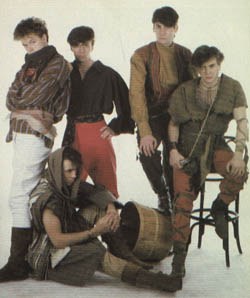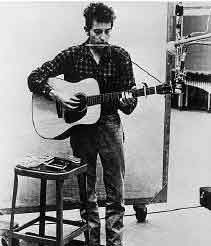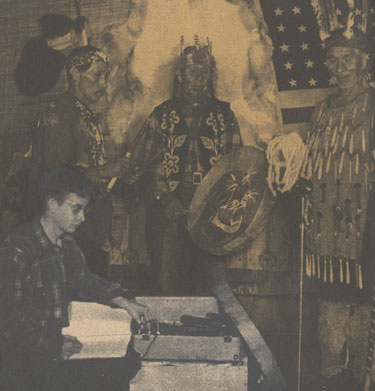|

|
THE
WORLD OF POP #2
I hate crap-pop but I love music. I love love love luv luv
lurv music. That was a Woody Allen reference, and all you
Woody Allen sycophants better take heed, because it's one
of the few references I'll ever make to that overrated man.
Did you place the reference? It's from Annie Hall,
still my favorite of his flicks (along with the slapstick
Take The Money and Run, pretty much the only two
I can even look back on fondly, but that's the subject of
another column). It's when the Woodman is professing his
love to Ms. Keaton, saying "I love you, I love you, the
word 'love' isn't even enough to express how much . . ."
and then to prove it, or to try find a way to indeed express
it, he says it, "I lurv you." I like that, that's funny,
and it also exemplifies one of my favorite themes: that
words as we know them are often (perhaps even usually) inadequate
when it comes to expressing actual soul-feeling.
Which may sound like a digression, but it's not, because
music, which I totally lurv, is an artform in which words
are actually unnecessary, and often when do  they
do exist, they are quite willfully secondary to just plain
sound - and sound can be as near a correlative for soul-feeling
as I've come across in the man-made arts. That's why I lurv
it so much, because, as even a crap-pop band like Spandau
Ballet said back in 1980-something, "This is the sound of
my soul." And they said it during a truly great sexy pop
song called "True," a song so smooth and even emotional
that it truly might have been the sound of Spandau Ballet's
soul, which proves that even crap-pop can come up with the
goods sometimes. (If you've been reading my column, you
know the ratio: 0.2 percent of the time. 99.8 of crap-pop
music is indeed crap. Worthless. You should never, never
listen to it. It's quite honestly as bad for you as a drug
habit. I'm not exaggerating. It's as bad for kids as eating
lots and lots of sugar in their diets. Parents - you don't
let your kids drink soda-pop and eat junk-food all day,
so why do you let them listen to Britney and N'Sync?) they
do exist, they are quite willfully secondary to just plain
sound - and sound can be as near a correlative for soul-feeling
as I've come across in the man-made arts. That's why I lurv
it so much, because, as even a crap-pop band like Spandau
Ballet said back in 1980-something, "This is the sound of
my soul." And they said it during a truly great sexy pop
song called "True," a song so smooth and even emotional
that it truly might have been the sound of Spandau Ballet's
soul, which proves that even crap-pop can come up with the
goods sometimes. (If you've been reading my column, you
know the ratio: 0.2 percent of the time. 99.8 of crap-pop
music is indeed crap. Worthless. You should never, never
listen to it. It's quite honestly as bad for you as a drug
habit. I'm not exaggerating. It's as bad for kids as eating
lots and lots of sugar in their diets. Parents - you don't
let your kids drink soda-pop and eat junk-food all day,
so why do you let them listen to Britney and N'Sync?)
Bob Dylan is a great artist who, it could be said, makes
words more important than sound. Because he's not a classically
'correct' singer, and his songs are fairly simple chordally
and harmonically, the main focus is his inventive poetic
flow of lyrics. This is true up to a point, but I submit
that Dylan's singing and lyrics can be taken  either
way: as word-over-sound or as sound-over-word. Because when
he really gets going, and really starts chaining his images
together, it becomes impossible to really register each
word. I defy anyone to listen to "Desolation Row" or "Sad
Eyed Lady of the Lowlands" or "Jack of Hearts" and actually
hear each word. You can probably catch and follow and pay
attention to 70 or even 80 percent of them, but at some
point you're gonna be reading something or dusting your
shelf or washing your dishes or staring at the ceiling with
your eyes closed, and you're gonna find that you missed
a few lines here and there. Just like when you're reading
a book, and you realize that you've just read a page-and-a-half
without processing a damn thing. You go back and re-read
it, this time with more concentration, and even though you've
already 'read' through it, you uncover entire paragraphs
for what feels like the very first time. The same thing
happens when you space out during a Bob Dylan song; it is
at these times that the overall sound of the song, including
the sound of the sung words, takes primacy over the meaning
of the words. Just like in the book where you find yourself
reading without really processing the language, the visual
gestalt of a book as an object with ink arranged sequentially
on its pages takes primacy over the meaning of the words.
The sound overwhelms the words, the ink overwhelms the words.
This happens to all of us, even when we're listening to
pop music. I guess that's a good as an ending for this installment
of The World of Pop as any. either
way: as word-over-sound or as sound-over-word. Because when
he really gets going, and really starts chaining his images
together, it becomes impossible to really register each
word. I defy anyone to listen to "Desolation Row" or "Sad
Eyed Lady of the Lowlands" or "Jack of Hearts" and actually
hear each word. You can probably catch and follow and pay
attention to 70 or even 80 percent of them, but at some
point you're gonna be reading something or dusting your
shelf or washing your dishes or staring at the ceiling with
your eyes closed, and you're gonna find that you missed
a few lines here and there. Just like when you're reading
a book, and you realize that you've just read a page-and-a-half
without processing a damn thing. You go back and re-read
it, this time with more concentration, and even though you've
already 'read' through it, you uncover entire paragraphs
for what feels like the very first time. The same thing
happens when you space out during a Bob Dylan song; it is
at these times that the overall sound of the song, including
the sound of the sung words, takes primacy over the meaning
of the words. Just like in the book where you find yourself
reading without really processing the language, the visual
gestalt of a book as an object with ink arranged sequentially
on its pages takes primacy over the meaning of the words.
The sound overwhelms the words, the ink overwhelms the words.
This happens to all of us, even when we're listening to
pop music. I guess that's a good as an ending for this installment
of The World of Pop as any.
|
|
ADVERTISEMENT
|
(HATS
OFF TO) HARRY SMITH Well first I loved him because
of his films. I saw his grizzled picture in the back of
Forced Exposure magazine, accompanying a review of
some films of his from the early 60s called "Early
Abstractions." By some sort of incredible frozen-hell
type of occurrence, some of those very films were showing
for free on the University of Nebraska campus just a year
or so later, for a class called Experimental Cinema. The
screenings were open to the public, so you can bet I went,
and as I sat there among puzzled jocks and sorority girls
with their baseball caps and Mead notebooks at the ready,
I was supremely dazzled by his geometric animations, replete
with psychedelic color and moving with the very logic of
nature itself.
Then I realized
that this was the guy who got the first Fugs album made.
Wow! And THEN I realized that he was the guy who got an
ever better album made: The Smithsonian Anthology of
American Folk Music. In fact, he compiled it top to
bottom from his own collection of 78s. This is the album
which John Fahey called one of the most important collections
of information EVER, and I actually don't doubt him. After
all, it gives us some 60 to 70 songs by some 50 to 60 different
artists, most of whom are singing about an era of American
history that would be as forgotten as their names if Smith
hadn't given their ultra-rare records a new life. For example,
the Carolina Tar Heels, singing "In the days of 18-and-1,
peg and awl, peg and awl....in the days of 18-and-1, peg
and awl....in the days of 18-and-1, peggin' shoes is all
I've done, hand me down my peg, my peg, my peg, my awl...."
Sure, your history teacher AND your sociology teacher could
stand in front of your classroom full of sleeping jocks
and sorority girls and say "In 1801, shoe factories
were a common source of work" but it just doesn't connect
like it does when you hear the Carolina Tar Heels sing about
it in their androgynous high-lonesome voices. That's what
Fahey meant -- that and much, much more. Listen to it yourself.
I hear you can get the reissue CD box set for about 70 bucks
on amazon.com, and believe me, that's a bargain.

Harry
Smith on drugs: "At different points of my life I've taken
some kind of drug or other. Naturally I've taken them for
many years. The first one of those that became available
was Peyote. I first took it on the road just outside Sara
Carter's auto court. I wasn't sure if the top of my head
wasn't going to fly off. Someone had bought the proper type
of cactus in the floral department of a department store
in San Francisco, so we ate it. Anything that changes the
consciousness to a degree I think is usefulů."
Harry Smith on the results he expected from the Anthology:
"I felt social changes would result from it. I'd been reading
Plato's Republic. He's jabbering on about music, how you
have to be careful about changing the music because it might
upset or destroy the government. Everybody gets out of step,
you are not to arbitrarily change it because you may undermine
the Empire State Building without knowing it."
As
printed in Harry Smith's Anthology of American Folk Music,
Volume Four (Revenant
Records)
|
|

|
|
MORE INCREDIBLE
SURFABLE LINKS
The
Sixties: Literary Tradition and Social Change
This
is an online history book! Covers the Beats, Vietnam,
rock and roll, but starts with literary precursors
like Emerson, Thoreau, and Whitman, complete with
amazing scans of first-edition books. (Excellent
graphics throughout.)
A
Guide to SF Music Not
San Francisco music but songs with science fiction
themes! Everything from Anthrax's song about to
Judge Dredd to "Starship Trooper" by Yes
to Sonic Youth's Dick/Gibson references to Neil
Diamond ("'Heartlight' is based on 'E.T.'")
gets
mentioned.
A
really good site dedicated to Amon Duul 2 Somehow
I didn't expect this to be so cool...don't miss
the photos and the lyrics! Especially the lyrics....in
this case, English-as-a-second-language really adds
to the psychedelia...
|
|
|
|